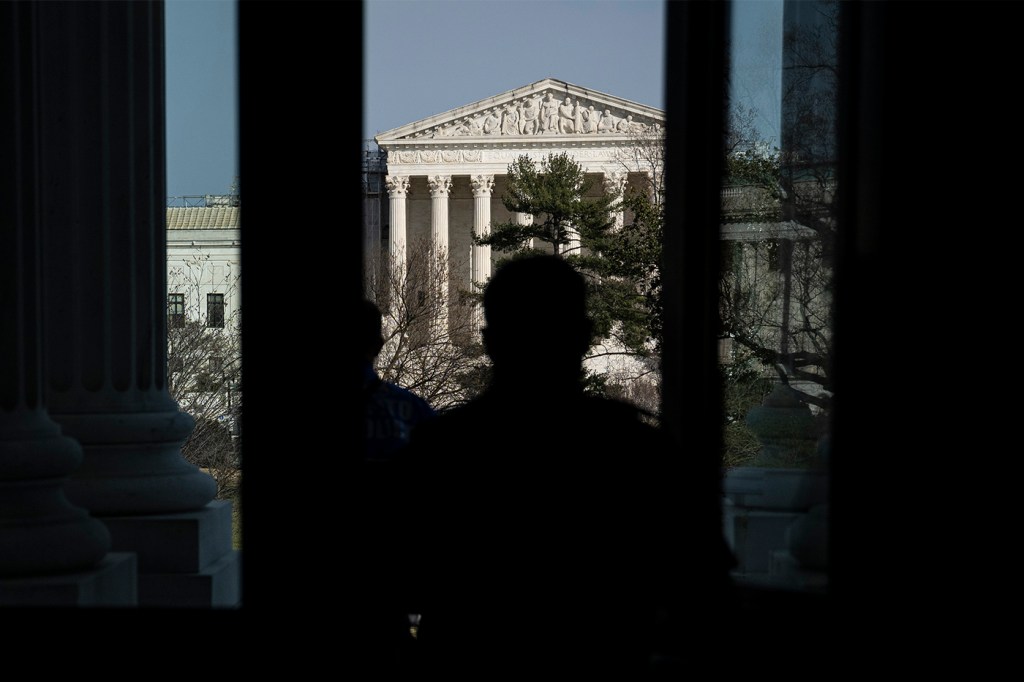How should social media companies be regulated? Oral arguments in Texas, Florida cases rehash theories, draw new battle lines
In the wake of the Jan. 6 attacks, Florida and Texas enacted laws barring social media companies from banning users for expressing political viewpoints. Now, the Supreme Court is hearing a challenge to the laws.

One of the more notable aspects of the Supreme Court’s review of Texas and Florida’s efforts to dictate social media policy is just how upside down the politics of it all feels, one Northeastern expert says.
“The alignment question here is so interesting, because historically the Republican Party is typically on the side of big business,” says Jeremy R. Paul, a professor of law and former dean of the Northeastern University School of Law.
Not so when it comes to Silicon Valley’s biggest tech companies, which have been under fire in recent years for content moderation policies practices many have said harbor anti-conservative bias. Laws proposed by the two southern states, which are currently on hold pending the legal challenge, are the clearest efforts yet to check the influence of companies like Twitter/X, Facebook and YouTube, Paul says.
But the battle lines drawn among the parties during Monday’s oral arguments before the high court painted a perplexing political portrait. A major Republican attorney was tapped to represent the tech platforms, and the “free speech” concerns undergirding the states’ arguments — a rallying cry for present-day conservatism — didn’t garner much sympathy from a majority right-wing bench.
“Paul Clement, as a longtime major legal figure in Republican circles, was true to form representing the tech companies and their interests, but the government officials pushing for these statutes are all Republicans,” Paul says.
In the wake of the Jan. 6 attacks, Florida and Texas enacted laws barring social media companies from banning users for expressing political viewpoints. Florida’s law imposed fines on companies such as Twitter/X, Facebook and YouTube for banning political candidates — as a response to the deplatforming of Donald Trump following the attacks.
The Texas law made it possible for citizens or the state’s attorney general to sue those platforms for removing political content from their websites. Both laws are seen as part of a broader effort on the part of conservative groups and politicians to rein in what they see as censorship of conservative viewpoints online.
In turn, two tech organizations — NetChoice and the Computer & Communications Industry Association — sued, arguing that the tech companies have a right to decide what content is permissible on their platforms under the First Amendment.
The companies brought what’s known as a “facial challenge” to the pair of laws. That means they’ve asked the justices to outright toss the statutes on the basis that they violate the Constitution.
Texas state attorneys have cast the laws as an attempt to prevent the companies from “discriminating against their customers on the basis of geography, association or viewpoint.”
Featured Posts
While the cases highlight the all-too-common pain points in the debate over the limits to free speech on platforms run by private companies and whether the online platforms engage in censorship, they also raise questions about whether the companies — in allowing certain viewpoints and disallowing others — behave more like newspapers, which enjoy broad First Amendment protections.
“In the way this case is set up, the tech companies are attempting to analogize themselves in the way of newspapers, which exercise editorial discretion over what they publish,” Paul says.
At the heart of the cases is a long-standing question: How should social media be regulated?
Another theory has been put forward: that they’re more akin to shopping malls, which are privately-owned, but play an important social function as a common place where the public gathers.
“One of the older analog versions of the issue at hand here is reminiscent of whether shopping centers were able to exclude people who wanted to come into the corridors and hand out leaflets and get signatures,” Paul says.
Beyond the newspaper and shopping mall analogies, there is the question of whether such platforms can be regulated as common carriers, or companies that provide public transportation or communication services, such as railroads, taxi services and telephone and cellular service.
Paul thinks the court will ultimately rule in favor of the tech companies.
“I would predict that the court will uphold the injunction and enjoin the application of these statutes,” Paul says.
But he doesn’t think the decision will be unanimous, pointing to potential resistance from Justices Clarence Thomas, Samuel Alito and potentially Neil Gorsuch.
A ruling in either direction would far from signal the end of debate. Paul notes that there are many questions about how to regulate tech platforms such as Twitter/X, Facebook and YouTube that aren’t likely to get resolved in these cases.
Still, the consequences of a surprise ruling would be far-reaching.
“If the state governments win these cases, and the statutes are allowed to stand, the long-standing principles underlying the First Amendment — and our basic understanding of how it works — would be shattered,” Paul says.











